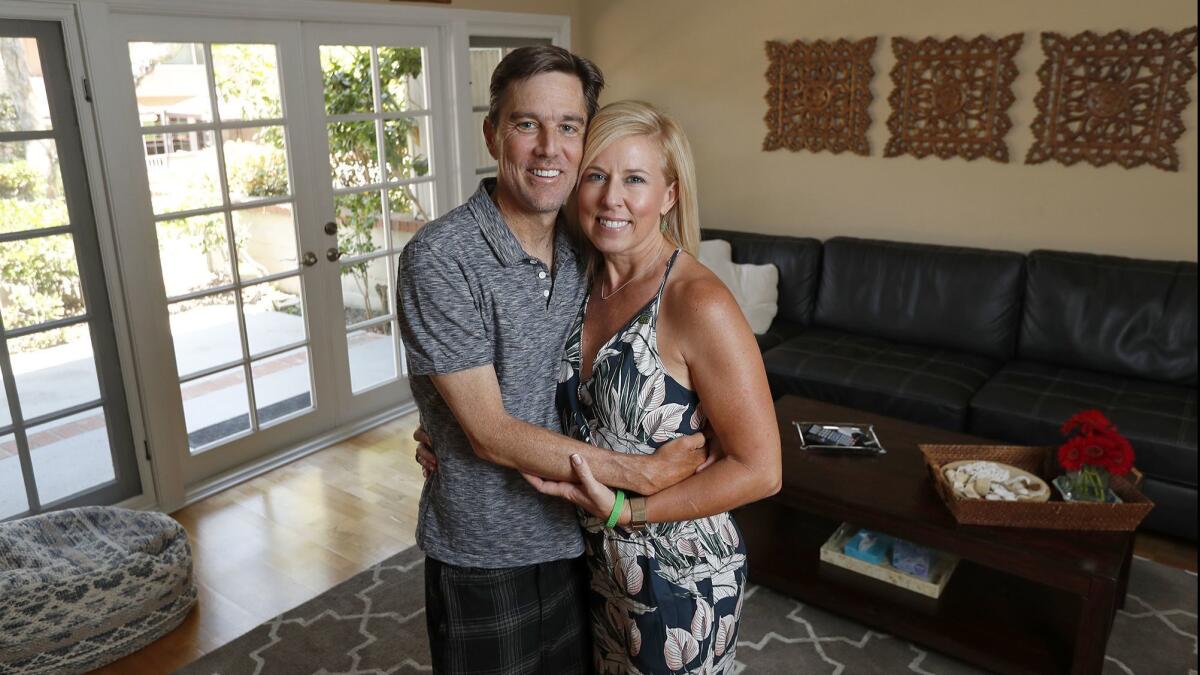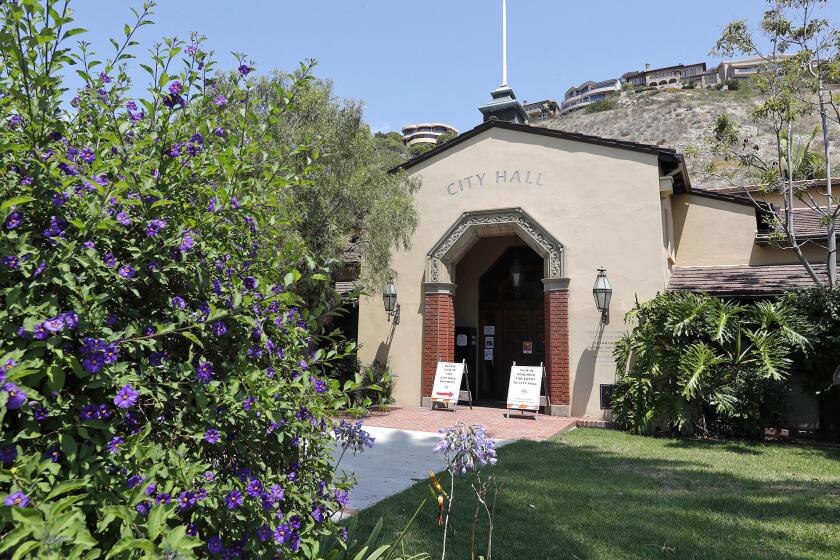Long search for a kidney ‘living donor’ ends at home

- Share via
John Ward was sitting on his living room couch sipping a Dr Pepper. His wife, Christy, was home talking with a colleague on her cellphone. Their son, Jack, 11, had just run out the door for an art class, and daughter Cali, 13, was at a rehearsal for a play.
It might have appeared to be a typical day for the Newport Beach family, but about three weeks earlier, John and Christy Ward lay side by side in an operating room at Keck Hospital of USC as one of her kidneys was transplanted into her ailing 48-year-old husband.
The three years leading to that operation were a nightmare. The disease that sapped all of John’s energy, fogged his mind and caused severe nausea that contributed to a 35-pound weight loss was hard to diagnose.
And once it was determined to be kidney failure, the road to the transplant was fraught with delays, disappointments and medical and bureaucratic hang-ups.
John, a filmmaker who specializes in Southern romances and loved coaching his son’s football and baseball teams, considers his wife the hero of this story.
“I am still overwhelmed,” he said. “It’s hard to explain how you feel when someone gives you an organ, and then it’s the woman who gave you your children.”
As many as 100,000 people are on the national waiting list for a kidney from a deceased donor, experts say, and the waiting period is estimated at eight to 10 years.
Every chance they get, the Wards speak out about the importance of living donors — family members, friends, even acquaintances who are determined an acceptable match — to speed up the transplant process.
“It is rare that you have the ability to save someone’s life,’’ said Christy, 47. “It’s a beautiful gift — hope for a new life.”
The first indication that something was wrong with John, founder of Bayridge Films, was a “freshman-year film school” editing error in a music video he was directing in Nashville, Tenn. The family was living in Wilmington, N.C., at the time, and doctors there were at a loss to explain his overwhelming fatigue, nausea and high blood pressure.
He fell seriously ill during a family trip to Florida for a hockey tournament, and when he got home, a stunned doctor informed Christy that her husband was in end-stage renal failure, with kidneys at 1% of normal function. He was moved to the University of North Carolina Medical Center, where he underwent several weeks of testing.
The two leading causes of kidney failure are diabetes and high blood pressure, experts say.
“They could not figure out what caused it,” John said. “I don’t have diabetes. I don’t drink. I don’t smoke. I’m young.”
About a year after his symptoms started, he was diagnosed with a rare autoimmune blood disease that attacks only renal tissue. Because of that, finding the right transplant center took awhile.
Some doctors expressed concerns that the disease would weaken a new kidney, according to John.
In the meantime, the family moved to Newport Beach, where they had lived before returning to their hometown, Wilmington. Ward began seeing doctors at Hoag Hospital, where his wife is assistant vice president of the foundation. For almost two years, he had four hours of dialysis three times a week while he awaited news about a hospital to perform the transplant.
Another complication was that John’s sister — an almost perfect biological match — was ruled out as a donor because she is prone to kidney stones and having one kidney was considered potentially dangerous for her.
Christy stepped in, though she wasn’t considered a high-ranking match. However, the procedure wasn’t expected to harm her health or John’s.
Finally, Keck Hospital agreed to collaborate with Hoag physicians for the transplant, which took place June 6.
Because of John’s blood disorder, “they said it may not last as long as other kidneys but an institution like this occasionally needs to take a risk and move forward,” Christy said.
Dr. Kambiz Vahabzadeh, John’s nephrologist at Hoag, saw the family’s struggles as he monitored John’s progress and coordinated with the transplant team at Keck.
“This was one of the most amazing families — strong and dedicated,” Vahabzadeh said. “The reason it went through was all the people he had on his side.
“It’s nice to know that someone who has fought a lot of battles can get to where they want to be.”
Christy was released from Keck two days after the transplant. She is tired sometimes but is getting better.
“So you take a nap,” she said. “It’s no big deal,”
Her husband was released a week after the surgery but was briefly admitted to Hoag after having neurological issues related to his medication.
Since then he has put on 20 pounds and said his mental clarity is returning. He still must take anti-rejection pills for the kidney, and he’ll likely be tested and treated for the blood disorder the rest of his life.
But he has been able to enjoy Dr Pepper again — he hadn’t had one for three years — and to attend his son’s games.
John said a recent follow-up visit to Keck got him thinking about people with kidney disease who aren’t as fortunate as he.
“I saw this guy get off a bus, and he could barely walk and was by himself,” he said. “Then I’m looking across the waiting room and see that guy and thinking he needs an advocate. How is he going to make it through this?”
John expects to be off work for three months. But he has already addressed kidney disease in a screenplay called “Eye of the Storm,” which he wrote last summer during periods when he felt able to work.
It’s a romance with a difference.
“In the end, they are not together, but she gives him a kidney and they go their separate ways,” he said. “That will be the next picture I make, as soon as I get on my feet.”
For more information about kidney disease and living donors, go to onelegacy.org
Susan Gill Vardon is a contributor to Times Community News.
All the latest on Orange County from Orange County.
Get our free TimesOC newsletter.
You may occasionally receive promotional content from the Daily Pilot.



